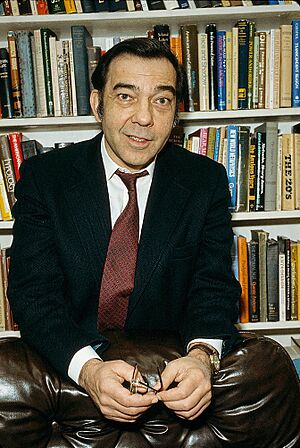Sacvan Bercovitch facts for kids
Sacvan Bercovitch (born October 4, 1933, died December 8, 2014) was a Canadian expert in literature and culture. He spent most of his life teaching and writing in the United States. For five decades, he was a very important and sometimes debated figure. He helped shape the field of American studies, which looks at American history, literature, and culture.
Contents
His Education and Teaching Career
Bercovitch was born in Montreal, Quebec. His first name, Sacvan, was created by combining the names of two famous people, Sacco and Vanzetti. He earned his first degree from Concordia University in 1958. Later, he received his Ph.D. from Claremont Graduate University in 1965. Both universities later gave him honorary degrees.
Bercovitch taught at several well-known universities. These included Brandeis, the University of California-San Diego, Princeton, and Columbia. From 1984 until he retired in 2001, he taught at Harvard. There, he held a special position as a professor of American Literature. In 1986, he became a member of the American Academy of Arts and Sciences.
He also visited and taught at many other places around the world. These included universities in Tel-Aviv, Rome, Paris, Beijing, Kyoto, and Moscow. He received several awards for his work. These included the Distinguished Scholar Award (2002) and the Jay B. Hubbell Prize (2004). He also won the Bode-Pearson Prize for his lifetime achievements in American Studies (2007).
His Writings and Ideas
Early Books and Puritan Ideas
Bercovitch's early books, like The Puritan Origins of the American Self, looked at the writings of the Puritans in New England. He showed how they used ideas from the Bible to understand their lives. He also explained how their imagination and beliefs shaped their culture.
He believed that Puritan writings helped create a special "American" identity. This identity grew from their idea of America as a new promised land. Unlike other colonists, the Puritans saw their new home as separate from the "Old World" of Europe. They used their religious ideas to explain their mission in the New World. This way of thinking helped form the idea of the United States as "America."
Some people criticized Bercovitch for not focusing enough on the Puritans' spiritual values. But he saw their legacy as a way of thinking that helped a community grow into a major nation. He showed how their religious influence shaped their ideas about their mission in the New World.
Later Books and American Identity
Later, Bercovitch explored how American culture developed in the 1800s and 1900s. His books, The Office of "The Scarlet Letter" and The Rites of Assent, looked at how American society handles different opinions. He argued that American culture often uses disagreement to make its main ideas stronger.
This idea caused some debate. Some people on the right criticized him as a new kind of scholar. Some on the left called him a historian who supported the idea of America being special. Bercovitch later explained that he also saw how people could resist these ideas. He also noted the strong power of American ideals.
In 2004, Bercovitch finished a huge project. He was the main editor of the multi-volume Cambridge History of American Literature. This work is considered a very important history of American literature.
His Impact on American Studies
Bercovitch's work has been translated into many languages. He changed how people studied early American literature. He also helped create a new way of looking at American literature and culture. His work focused on:
- Understanding American literary history through close reading of cultural texts.
- Showing the important religious parts of the "American Way."
- Explaining how the American identity is built through language and society. This includes ideas like shared beliefs and American exceptionalism.
- Connecting shared beliefs with creative expression. He showed how culture influences art and how powerful literary texts can be.
- Exploring how American society handles disagreement.
One historian said that Bercovitch's "bold writings marked an important shift in understanding culture." He was called "the foremost interpreter of early American literature for his generation." His work had a "transformative effect" on American literary studies.
Awards and Fellowships
Sacvan Bercovitch received many awards and fellowships throughout his life. He was a fellow at important centers like the Yale Center for American Studies. He also received grants from organizations such as the Ford Foundation and the Guggenheim Foundation.
He represented the Fulbright Scholar Program in Europe. He also gave many speeches at universities and conferences worldwide.
Bercovitch served on many professional boards and committees. He won awards for both his teaching and his writing. These included the Brandeis Award for Excellency in Teaching (1967). He also won the James Russell Lowell Prize (1992) for the best scholarly book. He was President of the American Studies Association from 1982 to 1984. He received Lifetime Achievement Awards from both the Modern Languages Association and the American Studies Association.
After he retired, Bercovitch went back to his early interest in Jewish Studies. He translated works by Sholom Aleichem and other Yiddish writers. He received a grant for a project on "The Ashkenazi Renaissance, 1880-1940."
His Teaching Style
Bercovitch was a very popular teacher for both undergraduate and graduate students. Many of his former students now hold important positions at universities around the world. These include places like Yale, UCLA, Beijing, Oxford, and Rome.
One former student said he had "enormous talents as a teacher." This student explained that Bercovitch showed how language can share ideas. But it can also help people "break free" from old ideas and find new ways of understanding.
Another former student said that Bercovitch's example of careful study and curiosity was very influential. His students learned not to just copy his work. Instead, they learned to think for themselves and be original. This is what honored him the most.
 | Calvin Brent |
 | Walter T. Bailey |
 | Martha Cassell Thompson |
 | Alberta Jeannette Cassell |


